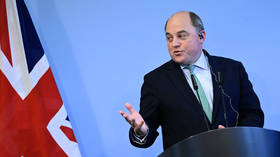Biden dashes Wallace’s hopes to become next NATO boss – Telegraph
The US president’s snub of the UK defense secretary’s candidacy could sour bilateral relations, according to the paper’s sources
The British government is frustrated by US President Joe Biden’s decision not to endorse the candidacy of UK Defence Secretary Ben Wallace to become the next NATO secretary-general, the Daily Telegraph reported on Thursday, citing sources.
According to unnamed senior British officials interviewed by the paper, London felt “badly let down” by Biden’s apparent refusal, suggesting that it could throw a wrench into the ‘special relationship’ between the two Western states. “We’re supposed to be their closest ally. And this is what we get. It is what it is… but it is bad for UK-US relations,” one source said.
He also went on to complain that Washington has done the UK “a bad turn” by favoring a “Danish lady,” an apparent reference to Mette Frederiksen, the prime minister of Denmark, who has been rumored to have good chances of becoming the next NATO chief.
However, according to the report, while Biden initially wanted Frederiksen to succeed Jens Stoltenberg, the current secretary-general of the US-led military bloc, he cooled on her candidacy after she failed to impress him during a recent meeting in Washington.
Wallace, who emerged as a staunch anti-Russia hawk amid the Ukraine conflict, is said to have been a popular choice among numerous NATO members. However, his candidacy was met with opposition from several European leaders, who pushed for the next NATO boss to come from an EU nation, the report says. One Telegraph source accused France and Germany of “scrabbling about” to prevent Wallace from taking the job.
Against this backdrop, Washington has reportedly convinced several of its European allies to put off the replacement decision while trying to persuade Stoltenberg, who has held the post for nine years, to agree to stay on for another 12 months.
Earlier this month, Biden publicly said that the UK defense secretary would make a “very qualified” leader of the bloc, though he stopped short of throwing his weight behind his candidacy.
In an interview with The Economist on Wednesday, Wallace, who had previously spoken in length about his vision for the bloc’s future should he become its next leader, signaled that he now has no plans to contend for this job.






Comments are closed.